Work samples
-
Todd Marcus - jazz bass clarinetist, composer, and arrangerBass clarinetist, composer, and arranger Todd Marcus is one of the few jazz artists worldwide to focus exclusively on use of the bass clarinet as a primary instrument in jazz. While use of bass clarinet in jazz typically leans heavily towards avant-garde and free-jazz styles, Marcus' presents the instrument with a modern straight-ahead jazz approach. His music swings hard with both fiery and introspective intensity but also maintains a strong lyrical sensibility. Based in Baltimore, MD, Marcus actively leads small ensembles such as the Todd Marcus Quartet, Trio, and Duo as well as his nonet, The Todd Marcus Jazz Orchestra. Self taught in jazz theory and composition, Marcus' compositions draw largely on straight-ahead jazz and classical influences but over recent years have also increasingly explored the Middle-Eastern sounds from his Egyptian-American heritage.
About Todd
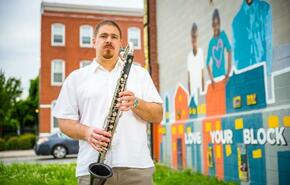
Bass clarinetist/composer Todd Marcus is one of the few jazz artists worldwide to focus their work primarily on the bass clarinet.
Though use of bass clarinet in jazz typically leans heavily towards avant-garde and free-jazz styles, Marcus’ straight-ahead playing has carved out a unique voice for the instrument in modern jazz. His music swings hard with both a fiery and introspective intensity but also maintains a strong lyrical sensibility.
… more
about Todd Marcus - bass clarinetist, clarinetist, composer, and arranger
Born and raised in the northern New Jersey suburbs of New York City, the half-Egyptian Marcus began music at age six with early piano lessons. He picked up clarinet at age 10 first playing band then classical music repertoire. While in high school, an English teacher who also played New Orleans style jazz piano would introduce Marcus to jazz. But upon trying to join the school’s jazz band, Marcus was told saxophones, not clarinets, were the reed instruments allowed in the band and he was turned away.
In 1994 Marcus moved to Baltimore, MD to study political science at Loyola University and again attempted to join the school’s big band. This time Marcus was allowed to play and embraced the opportunity. With this first exposure to modern jazz along with a new friend’s borrowed jazz records of artists like Oscar Peterson, Stan Getz, Charlie Parker, Miles Davis, and John Coltrane, Marcus began to further explore the music learning improvisation from records and teaching himself theory and harmony. “I started exploring and realized I would have to figure out how to understand theory and harmony. So I’d just mentally drill myself by thinking - Ok, what is the minor 7th of an E dominant chord? – just exercises like that. And then of course, I learned a lot by just sitting at the piano and plucking away till I could play chord progressions.”
While at Loyola, Marcus also began volunteering at a local chapter of Habitat for Humanity in west Baltimore’s Sandtown-Winchester community. He soon began to build relationships with community members including a life-long resident and pastor, Rev. C.W. Harris, who mentored him about the African-American community’s rich legacy of the arts and jazz, segregation challenges, and battles to overcome decades of poverty resulting from destruction by 1960’s riots, flight by black professionals, and an influx of drugs. Harris’ mentoring nurtured Marcus’ interest in Civil Rights era history, its deep connection with the jazz music of that time, and Marcus’ feelings of the need for greater racial reconciliation in America. With a resulting belief in a need to be engaged in community based revitalization, Marcus left college and in 1997 moved into the neighborhood doing community work by day and pursuing his ongoing study of jazz at night.
1997 also marked an important move for Marcus musically as he made the switch from clarinet to bass clarinet shortly after hearing the work of jazz legend Eric Dolphy on the instrument. “I felt it offered a lot more options than regular clarinet,” Marcus explains. “It hasn’t been easy because of challenges the bass clarinet presents on a sonic and mechanical level but I’ve worked to present the horn as an equal to saxophones in a straight-ahead playing context. With so few examples of people playing bass clarinet in modern jazz though, I think it’s ended up being an opportunity for me to chart some new territory for the instrument.”
In late 1998 Marcus returned to New Jersey to complete his college degree in urban studies with two semesters at Rutgers University. While there however, he spent a majority of his time at the school’s jazz department. Though not a music major, he was accepted by audition into the department’s jazz combos getting his first experience of performing in quartets, trios, and composing.
By mid 1999 Marcus was back in Baltimore working again with Rev. Harris where together they worked since to run Newborn Holistic Ministries (newbornholisticministries.com), a nonprofit addressing poverty related issues in the community. These efforts have resulted in the establishment in 2000 of Martha’s Place, the organization’s recovery program for women overcoming drug addiction and homelessness as well Jubilee Arts, a program established in 2008 to offer children and adults with alternatives to drugs and violence in the community. Accomplishments have also included significant community revitalization through the renovation of multiple abandoned buildings and vacant lots and community beautification with greenspaces and murals.
Marcus’ music career has also grown during these years as he has charted new ground on the bass clarinet and developed as a composer and arranger with his Todd Marcus Quartet, Trio, and Duo as well as his nonet, The Todd Marcus Jazz Orchestra. In 2006 he released his debut album In Pursuit of the 9th Man with his Todd Marcus Jazz Orchestra as well as his Todd Marcus Quartet’s 2012 release Inheritance.
Though self taught in jazz theory and composition, Marcus’ compositions draw largely on intricate but lyrical straight-ahead jazz, classical influences, and over recent years have also increasingly explored the Middle-Eastern sounds from his Egyptian-American heritage. His work includes international performances, clinics, and radio play and he has worked with other jazz artists such as Bennie Maupin, Don Byron, Larry Willis, Odean Pope, Tim Warfield, Sean Jones, George Colligan, Orrin Evans, Joel Frahm, Xavier Davis, Mike Formanek, and Gary Thomas. Marcus was also a featured guest at the 1st World Bass Clarinet Convention in Rotterdam, Holland where his work was recognized for both his compositions and unique solo voice.
“My adult life has really been about being a part of and serving my community by day and cultivating my music by night,” Marcus shares. “I think I’ve always felt upset by the injustice of inequities in the world and so being a part of my community has allowed me to specifically deal with ongoing issues that stem from systemic racism and poverty. And at the same time, my music has allowed me to try to create some beauty that hopefully unites people across all races through the power of music.”
-
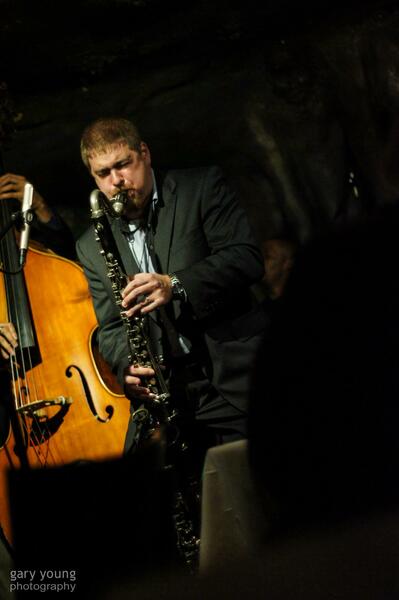 todd-marcus-bass-clarinet-solo--photo-courtesy-gar-2.jpg
todd-marcus-bass-clarinet-solo--photo-courtesy-gar-2.jpg -
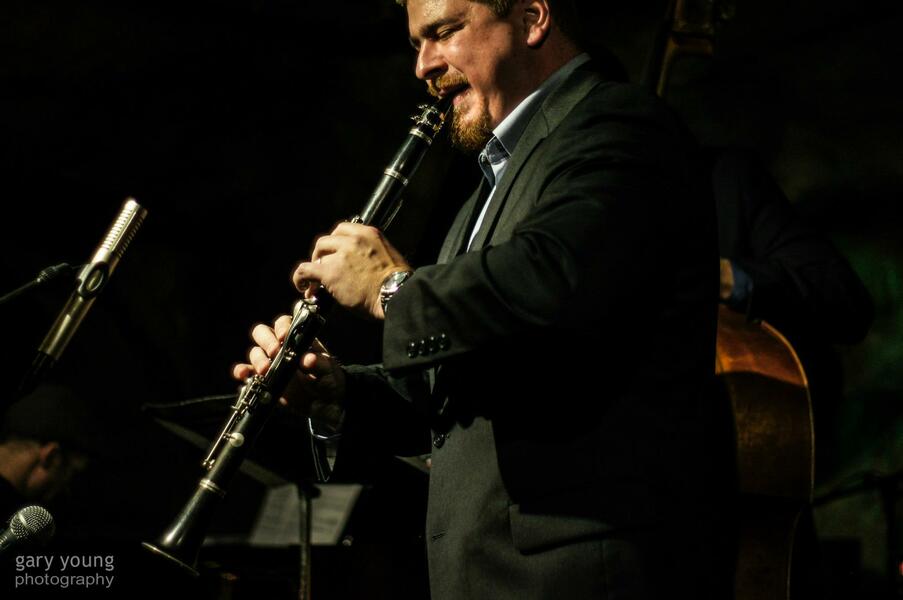 todd-marcus-clarinet-solo--photo-courtesy-gary-you-2.jpg
todd-marcus-clarinet-solo--photo-courtesy-gary-you-2.jpg -
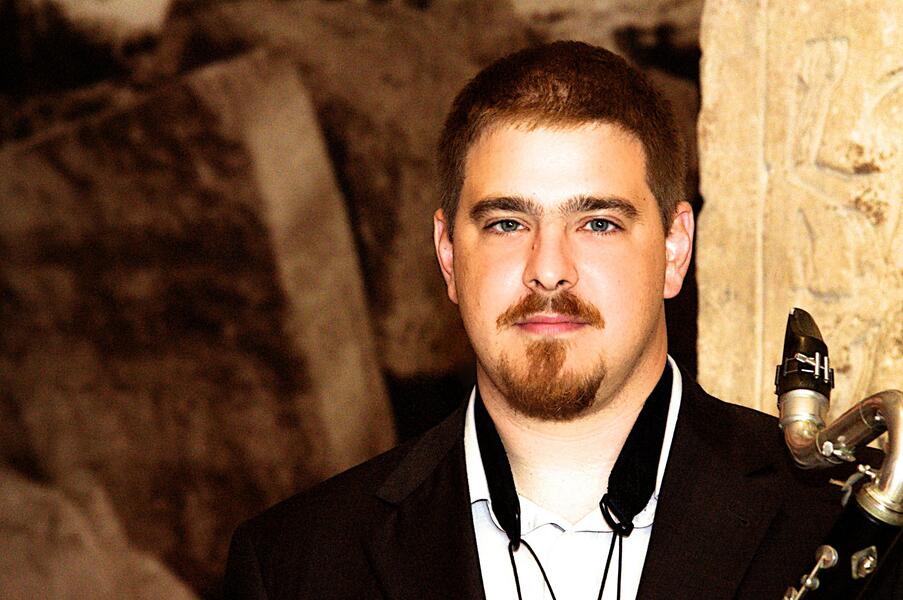 todd-marcus--close-shot-3-carlyle-smith-soulphotog.jpg
todd-marcus--close-shot-3-carlyle-smith-soulphotog.jpg -
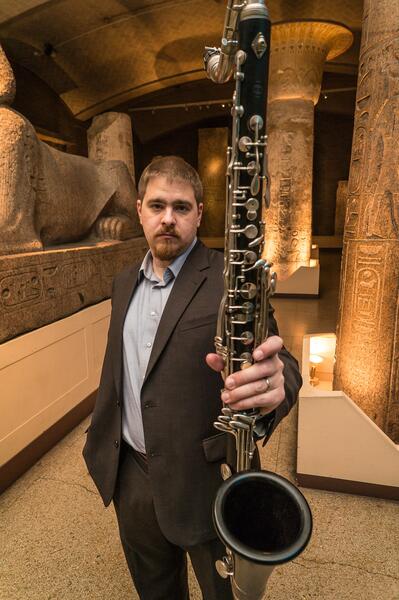 todd-marcus--medium-shot-1-gary-young-photography.jpg
todd-marcus--medium-shot-1-gary-young-photography.jpg -
about Todd MarcusA 4-minute video about my work as a bass clarinetist, composer, arranger, and band leader of different sized ensembles
The Todd Marcus Jazz Orchestra
The Todd Marcus Jazz Orchestra is my nine member ensemble that includes six horns (bass clarinet, alto saxophone/flute, alto saxophone, tenor saxophone, trumpet, trombone) along with piano, bass, and drums. This ensemble presents my original compositions and arrangements, jazz standards, and demonstrates my work of presenting the bass clarinet as a legitimate lead horn in modern jazz deserving of equal consideration with more traditional jazz horns like the saxophone and trumpet.
I've been composing and arranging my work for this group since 2001 and have always loved how it allows me to achieve a great power and range with the horn section but still allows soloists the opportunity to be very creative with extended improvisations.
Over recent years I've increasingly explored composing and arranging with multiple different themes that are stated individually but then later in the arrangement find a way to merge in a way that is simultaneously complex, intense, and a greater emotion than when any one of the themes were first stated individually. It's a break from the traditional jazz form and an approach that I think helps a composition have an ever evolving momentum.
The past couple years have also been important ones for me with this ensemble as I've explored the incorporation of Middle Eastern music into jazz. This has stemmed from my own journey to dig deeper into my half-Egyptian ethnicity and I think it is a insightful reflection of both my American culture (through jazz) and Egyptian culture (through Middle Eastern music). This effort has been a challenging one though as jazz and Middle Eastern music are constructed very differently. While the harmonies in jazz are a crucial element that define its sound, traditional Middle Eastern melodies typically do not use harmony and focus more on unison themes. So in many ways my efforts to merge these two musics is the perfect metaphor for me as an individual who continues to explore and integrate his Americian and Egyptian cultures.
-
Cairo Street RideA composition that aims to capture the streets and chaotic traffic of modern Cairo. The composition captures with the coasting pulses of an open road, car horns beeping at each other in a sort of above ground sonar mode, music actually replicated from an actual cab driver’s radio, to the sounds of cars speeding up and slowing down. Cairo Street Ride is part of the 2022 album In the Valley by the Todd Marcus Jazz Orchestra on Stricker Street Records. In The Valley was made possible with support from Chamber Music America's 2016 New Jazz Works program funded through the generosity of the Doris Duke Charitable Foundation.
-
Final DaysWritten in the winter of 2016-2017 during Marcus's last visit to the home where he’d grown up in New Jersey and where his father had passed away a few months earlier. Marcus wrote one of the main themes while going to bed one night during this visit and thinking about how it would be his last time being there and the end of his family’s time there after so many years. Other sections were added later to try to capture the winter wind blowing over snow on the yard and shadows of trees falling on the family home of 40 years. Final Days is part of the 2022 album In the Valley by the Todd Marcus Jazz Orchestra on Stricker Street Records. In The Valley was made possible with support from Chamber Music America's 2016 New Jazz Works program funded through the generosity of the Doris Duke Charitable Foundation.
-
HorusNamed after the ancient Egyptian deity Horus who has the head of a falcon and body of a man, this composition evokes the sounds of classical Middle Eastern music by using sounds modeled after maqams (Middle Eastern scales). Though Horus is an ancient deity of the sky, he remains a part of modern Egyptian culture including as the logo of Egypt Airlines. Horus is part of the 2022 album In the Valley by the Todd Marcus Jazz Orchestra on Stricker Street Records. In The Valley was made possible with support from Chamber Music America's 2016 New Jazz Works program funded through the generosity of the Doris Duke Charitable Foundation.
-
Many MoonsA complex multi-movement composition that opens with a slow exposition till 1:41 when fragments of the theme are reintroduced and added into new components. The piece is reflective of a style I've often focused on using multiple overlapping themes. Solos on this piece are separated by additional composed sections before the original opening theme re-emerges at 11:23 overtop of new shifting harmonies and bass lines. Filmed June 16, 2013 at the 14Karat Cabaret Club in Baltimore, MD featuring: Todd Marcus (bass clarinet) Gary Thomas (tenor sax) Brent Birkhead (flute and alto sax) Russell Kirk (alto sax) Alex Norris (trumpet) Alan Ferber (trombone) Alex Brown (piano) Jeff Reed (bass) Eric Kennedy (drums)
-
Message to PrezMy arrangement of a beautiful composition by Bennie Maupin, one of the few other instrumentalists to utilize the bass clarinet. Here I've taken his piece's repeating bassline and counterline (heard in their original form at 1:15-2:04 ) and fleshed out a full arrangement including new harmonies and additional solo section (at 4:35-7:54). Filmed January 21, 2013 performance at the Kennedy Center with: Todd Marcus (bass clarinet) Lyle Link (tenor sax) Brent Birkhead (flute and alto sax) Russell Kirk (alto sax) Alex Norris (trumpet) Darent Polk (trombone) Xavier Davis (piano) Jeff Reed (bass) Warren Wolf (drums)
-
Blues for Tahrir SuiteThe Blues for Tahrir Suite is an example of my more recent fusion of jazz and Middle Eastern music as explained in the project description for my Todd Marcus Jazz Orchestra. This suite presents three movements - Adhan (the Arabic word for the Islamic call to prayer that sounds five times a day from all mosques), Reflections, and Protest. The suite gets its name after Tahrir Square in Cairo Egypt where much of the protests over recent years have been centered. The different movements of the suite attempt to capture different moods of the Arab Spring movement in Egypt. The suite uses Middle Eastern inspired melodies which in a traditional Middle Eastern setting would be played in unison with other instruments or vocalists.
-
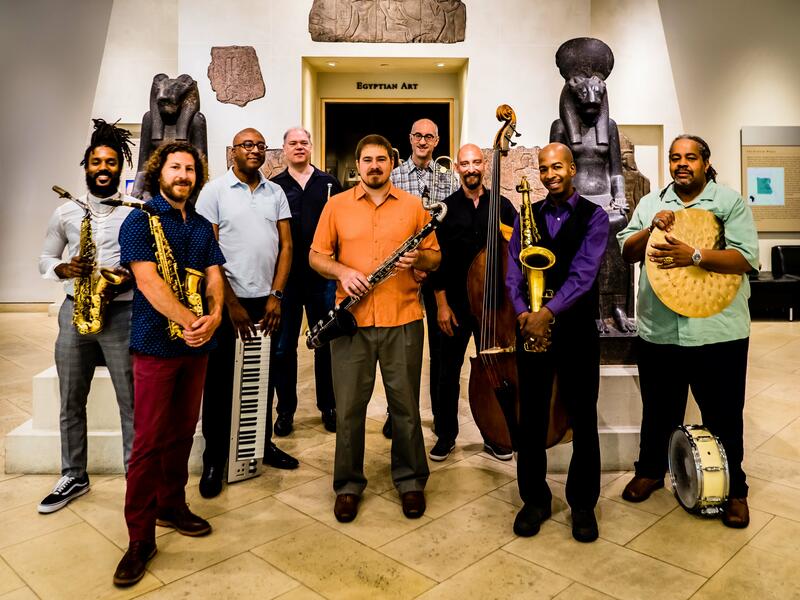 Todd Marcus Jazz Orchestra - smiling pose 1 (photo by Efrain Rebeiro).jpgA photo of The Todd Marcus Jazz Orchestra at the Egyptian exhibit at the Walters Art Museum. Photo courtesy of Efrain Ribeiro.
Todd Marcus Jazz Orchestra - smiling pose 1 (photo by Efrain Rebeiro).jpgA photo of The Todd Marcus Jazz Orchestra at the Egyptian exhibit at the Walters Art Museum. Photo courtesy of Efrain Ribeiro.
The Todd Marcus Quartet
I've been composing and arranging my work for this group since 2005 and it allows me to give great focus to both my compositions and soloing. While some material that this ensemble performs is also featured with my large nine member jazz orchestra, there are some works that I present only in this context because of the flexibility of this small ensemble format.
The past couple years have also been important ones for me with this ensemble as I've explored the incorporation of Middle Eastern music into jazz. This has stemmed from my own journey to dig deeper into my half-Egyptian ethnicity and I think it is a insightful reflection of both my American culture (through jazz) and Egyptian culture (through Middle Eastern music). This effort has been a challenging one though as jazz and Middle Eastern music are constructed very differently. While the harmonies in jazz are a crucial element that define its sound, traditional Middle Eastern melodies typically do not use harmony and focus more on unison themes. So in many ways my efforts to merge these two musics is the perfect metaphor for me as an individual who continues to explore and integrate his Americian and Egyptian cultures.
-
InheritanceInheritance is a composition of mne inspired by a Branford Marsalis composition which itself shows inspiration from a composition by John Coltrane. The title communicates this nature of how jazz musicians often build upon (and pay homage to) works of the masters that have come before us. The melody uses a repeating sparse main theme with more intricate melodies mixed in and also features the extensive low to high ranges of the bass clarinet. The first solo shows my efforts to use the bass clarinet as an intense modern jazz capable of soloing over chord structures to generate intensity and momentum equal to more traditional jazz horns like the saxophone and trumpet. This is a departure from more traditional usage of the bass clarinet in jazz which tends to lean towards avant garde or slow textural playing. This selection also features solos from pianist George Colligan and drummer Warren Wolf with bass playing by Eric Wheeler.
-
CantataCantata is an original composition of mine that shows some of my classical roots with a main themed fugue that features my bass clarinet along with clarinetist Don Byron. The composition's second movement shifts to a jazz waltz and the clarinet and bass clarinet solos use this as the harmonic structure for improvisations before returning to the fugue theme to end the composition. The presence of Don Byron on clarinet is meaningful to me as he is one of the few jazz musicians over recent decades to apply the clarinet in a modern jazz context. His playing has served as an inspiration to me when I was starting in jazz and looking for examples that clarinet could be effectively used and helped pave the way for my own efforts to carve out a role for the bass clarinet as an intense modern jazz capable of soloing over chord structures to generate intensity and momentum equal to more traditional jazz horns like the saxophone and trumpet.
-
AmyPookieAmyPookie is an original composition of mine in the spirit of the great alto saxophonist Ornette Coleman. The playful melody features both uptempo and medium movements with unison playing. Solos for this composition start with a free uptempo bass clarinet solo that eventually transitions to a medium blues with a piano solo by George Colligan. The bass clarinet solo shows my efforts to use the instrument as an intense modern jazz capable of soloing at fast tempos to generate intensity and momentum equal to more traditional jazz horns like the saxophone and trumpet.
-
Bye Bye BlackbirdBye Bye Blackbird is an example of how I like to present jazz standards that jazz musicians love to play but with my own arrangement. This version uses an opening a closing groove that sets up the melody with my specified own harmonic and melodic arrangement. Solos are based on the traditional chord changes for the song but shift the meter from 4 beats per measures to 7 beats per measures. The first solo features pianist George Colligan and the second solo shows my efforts to use the bass clarinet as an intense modern jazz capable of soloing over chord structures to generate intensity and momentum equal to more traditional jazz horns like the saxophone and trumpet. This is a departure from more traditional usage of the bass clarinet in jazz which tends to lean towards avant-garde or slow textural playing.
-
Blues for TahrirBlues for Tahrir is an example of one of my more recent fusions of jazz and Middle Eastern music as explained in the project description for my Todd Marcus Quartet. It uses a contemplative feel by the rhythm section and melodies by my clarinet that are composed of different Middle Eastern scales. The recording features the use of Middle Eastern percussion played by Jon Seligman which serve as a rhythmic accent to the drum kit playing of Warren Wolf. After solos by myself on clarinet and pianist George Colligan, the song introduces a new Middle Eastern inspired melody which in a traditional Middle Eastern setting would be played in unison with other instruments or vocalists. In this setting though, I?ve assigned chords that fuse this Middle Eastern type theme with jazz harmonies without losing the essence of the Middle Eastern feel.
-
The Adventure of Kang and KodosThe Adventures of Kang and Kodos is an original composition of mine that features the rich low and high ranges of the bass clarinet. It is a short melody that opens into improvisational soloing over a minor blues form. The first solo demonstrates my efforts to use the bass clarinet as an intense modern jazz capable of soloing over chord structures at fast tempos to generate intensity and momentum equal to more traditional jazz horns like the saxophone and trumpet. This is a departure from more traditional usage of the bass clarinet in jazz which tends to lean towards avant-garde or slow textural playing. This selection also features solos from pianist George Colligan and drummer Warren Wolf with bass playing by Eric Wheeler.
-
How Deep Is the OceanHow Deep Is The Ocean is an example of how I like to present jazz standards that jazz musicians love to play but with my own arrangement. This version draws on my classical music roots by presenting a duet arrangement of the piece I created to feature bassist Eric Wheeler and my bass clarinet. Towards the end of the melody, the piano and drums enter and solos are played over the traditional chord changes to this jazz ballad.
-
WahsouliWahsouli (which means "my arrival" in Arabic) is an example of one of my more recent fusions of jazz and Middle Eastern music described in the project description for my Todd Marcus Quartet. It begins with a free drum solo till 3:42 when the main body of the composition begins several uptempo themes. These themes reflect influence of traditional Middle Eastern influenced melodies. These themes however are placed on top of jazz harmonies which give the work its unique identity as a fusion of Middle Eastern and jazz music. This piece also features one of my bass clarinet solos which demonstrate my ability to improvise on the instrument at fast tempos which are rarely done on bass clarinet. This is reflective of my efforts to establish the bass clarinet as a legitimate lead horn in modern jazz deserving of equal consideration with more traditional jazz horns like the saxophone and trumpet.
-
HerodHerod is an original composition of mine that has multiple movements. The first movement features a bass clarinet theme with improvisational ornamentation by clarinetist Don Byron. The composition's second movement features the statement of a new theme by pianist Xavier Davis before the horns return with the start of a steady tempo. The clarinet and bass clarinet solos use this an independently composed solo form with a latin feel that was originally inspired a John Coltrane composition entitled Wise One. The presence of Don Byron on clarinet is meaningful to me as he is one of the few jazz musicians over recent decades to apply the clarinet in a modern jazz context.
-
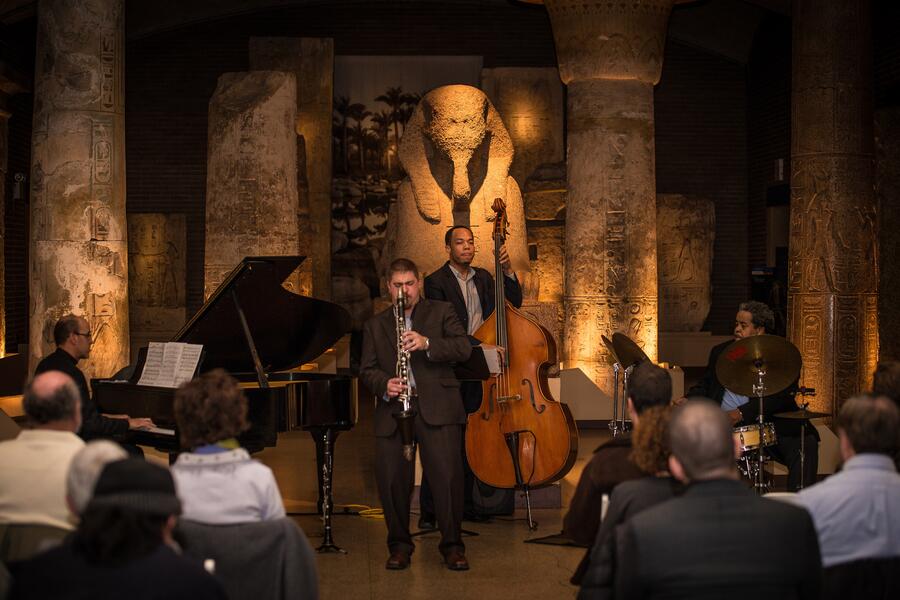 Todd Marcus QuartetThe Todd Marcus Quartet in performance in the Egyptian exhibit at the Penn Museum in Philadelphia, PA.
Todd Marcus QuartetThe Todd Marcus Quartet in performance in the Egyptian exhibit at the Penn Museum in Philadelphia, PA.
The Todd Marcus Trio
This ensemble also demonstrates my work of presenting the bass clarinet as a legitimate lead horn in modern jazz deserving of equal consideration with more traditional jazz horns like the saxophone and trumpet.
The material I present with this ensemble tends to focus on compositions with strong harmony and a great example is the multimovement Freedom Suite by legendary saxophonist Sonny Rollins which is presented here with the audio samples. This work has been a significant inspiration to me and I have recently composed my own trio suite that similarly features short but strong melodic themes that work well in this small ensemble.
-
The Freedom Suite - 2nd movementThe Freedom Suite is a composition by saxophonist Sonny Rollins that he recorded in the 1950's and featured his horn with bass and drums. The piece is a collection of a four short but strong themes that all have extremely rich harmony that is beautiful in a trio setting without piano. I learned and transcribed the horn, bass, and drum parts of the suite from the record and have enjoyed playing it over the years with my bass clarinet as the lead horn. This is the second movement which is a powerful waltz that doesn't feature any solos but has a great feel and works well with the tone of bass clarinet.
-
The Freedom Suite - 3rd movementThe Freedom Suite is a composition by saxophonist Sonny Rollins that he recorded in the 1950's and featured his horn with bass and drums. The piece is a collection of a four short but strong themes that all have extremely rich harmony that is beautiful in a trio setting without piano. I learned and transcribed the horn, bass, and drum parts of the suite from the record and have enjoyed playing it over the years with my bass clarinet as the lead horn. This is the third movement which is a beautiful ballad and features my bass clarinet solo as well as solos by bassist Jeff Reed and drummer Eric Kennedy.
-
The Freedom Suite - 4th movementThe Freedom Suite is a composition by saxophonist Sonny Rollins that he recorded in the 1950's and featured his horn with bass and drums. The piece is a collection of a four short but strong themes that all have extremely rich harmony that is beautiful in a trio setting without piano. I learned and transcribed the horn, bass, and drum parts of the suite from the record and have enjoyed playing it over the years with my bass clarinet as the lead horn. This is the fourth and final movement which is a fast theme that includes my bass clarinet solo as well as solos by drummer Eric Kennedy.
-
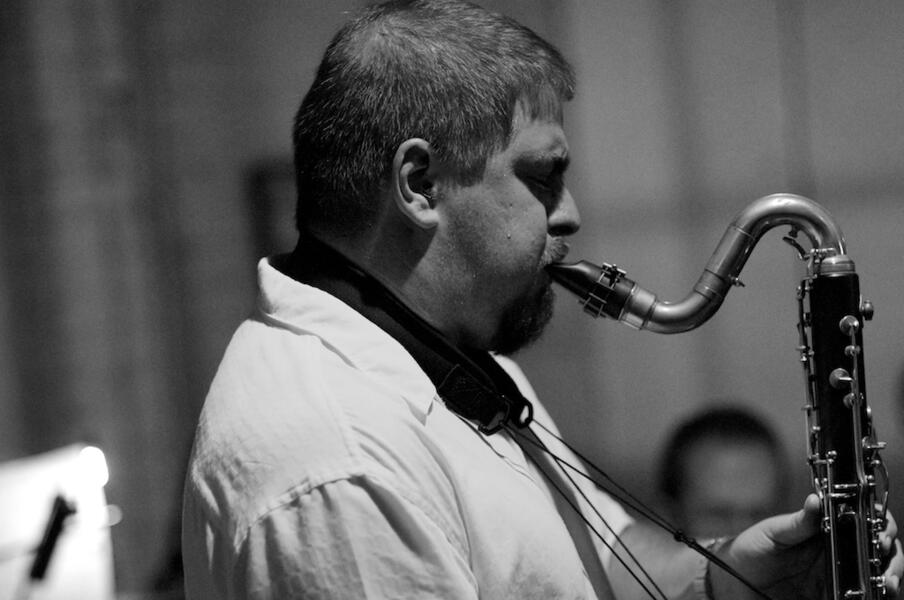 todd-marcus-side-bw-2.jpg
todd-marcus-side-bw-2.jpg -
The Freedom Suite - 1st movementThe Freedom Suite is a composition by saxophonist Sonny Rollins that he recorded in the 1950?s and featured his horn with bass and drums. The piece is a collection of a four short but strong themes that all have extremely rich harmony that is beautiful in a trio setting without piano. I learned and transcribed the horn, bass, and drum parts of the suite from the record and have enjoyed playing it over the years with my bass clarinet as the lead horn. This is the first movement is tricky due to some fast moving harmonies that I find force me to play a bit differently than normal. This recording comes from a live club performance and features my bass clarinet solo as well as a solo by bassist Jeff Reed.
The Todd Marcus Duo
This ensemble came about years ago by accident when a performance didn't offer a large enough budget to feature a full rhythm section. Initially I was apprehensive about the gig (a six hour performance with just the two of us) but I quickly found that we shared a common harmonic approach and were able to explore tremendous musical creativity and responsiveness with no other instruments to focus on except what each other were doing. This setting also really allows a context to hear the subtle textures of my instrument which sometimes get covered over when playing in louder ensemble settings with drums.
-
This Is NewI still like playing jazz standards in addition to original compositions and This Is New is a less commonly played tune that Harry Appelman introduced me too. There's nothing complex about the tune or arrangement - just a fun piece to play and improvise on. The final minute and a half also show of the exploration we like to do in this ensemble at the end of tunes with joint improvisation.
-
I Fall In Love Too EasilyI still like playing jazz standards in addition to original compositions and I Fall In Love Too Easily is a very pretty ballad that Miles Davis was fond of playing. We present it here in the duo setting with an improvised introduction by Harry Appelman for the two minutes before the melody is stated.
-
Donna LeeI still like playing jazz standards in addition to original compositions and Donna Lee is a tune by Charlie Parker that I've played for years. It's a fast intricate bebop melody but in the arrangement here I've toyed with the speed a bit so that it seems to speed up and slow down before the solos begin. This version includes an improvised introduction by Harry Appelman for the first minute and later solos by both me on bass clarinet and him on piano.
-
CantataCantata is an original composition of mine that shows some of my classical roots with a main themed fugue. The composition's second movement shifts to a jazz waltz and uses this harmonic structure for improvisations before returning to the fugue theme to end the composition. The melody features my bass clarinet with the piano but I switch to soprano clarinet for the solo.
-
The Adventure of Kang and KodosThe Adventures of Kang and Kodos is an original composition of mine that features the rich low and high ranges of the bass clarinet. It is a short melody that opens into improvisational soloing over a minor blues form.
-
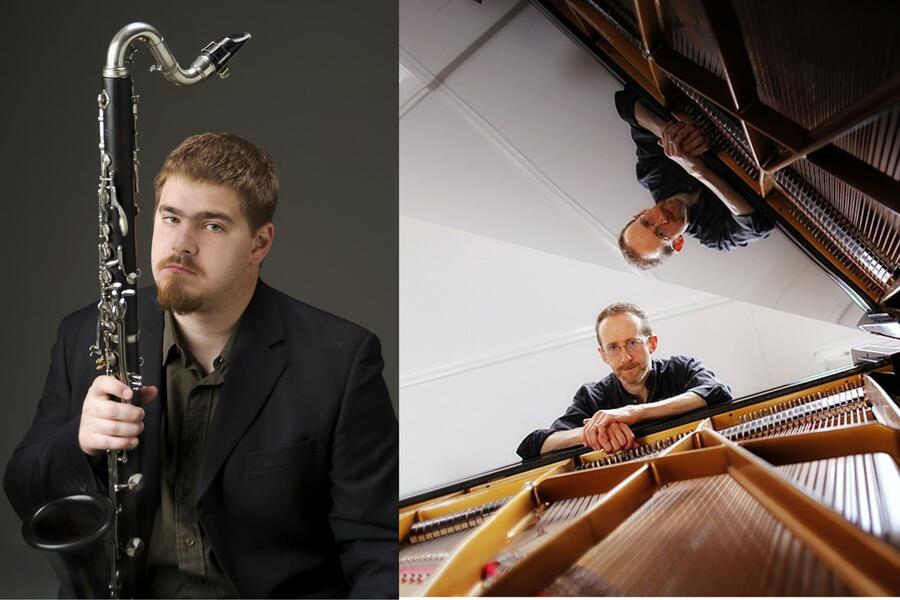 duo2-2.jpg
duo2-2.jpg -
Todd Marcus DuoTodd Marcus (bass clarinet) and Harry Appelman (piano) rehearsing in Baltimore at An Die Musik.
-
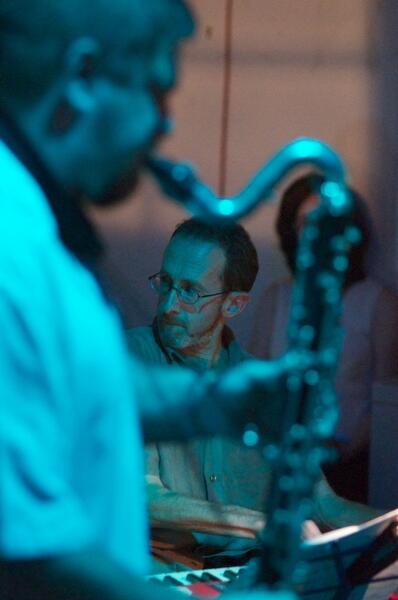 The Todd Marcus DuoTodd Marcus (bass clarinet) and Harry Appelman (piano) performing in Washington, DC.
The Todd Marcus DuoTodd Marcus (bass clarinet) and Harry Appelman (piano) performing in Washington, DC.
The Tariq Ensemble
This group began in 2009 but in many ways is still still in it's early stages as we hope to build on our early efforts and travel not just in the US but also with some touring of the Middle East.
-
Tunza HunzaThis is an original compositions by the ensemble's percussionist Jon Seligman and features his percussion work on a traditional Middle Eastern frame drum. There are both bass clarinet and piano solos after the melody before a return to the original melody.
-
DarijThis is a traditional Egyptian song called Darij which like many Middle Eastern compositions features an extended melody with unison playing by the instruments and open soloing forms. After solos however, the melody is restating with a reharmonization that uses modern jazz chords. Throughout, the rhythm is played on a traditional Egyptian style frame drum called a Riq which closely resembles the construction of a tamborine.
-
KorceThis is an original composition by the ensemble's pianist Harry Appelman that shows more of the jazz side than Middle Eastern side of the music presented by the ensemble. But it is a good example of the ensemble's range and how well the music works even without the presence of a bass player which is the traditional anchor for jazz ensembles.
-
WahsouliWahsouli (which means "my arrival" in Arabic) is an example of one of my more recent fusions of jazz and Middle Eastern music described in the project description for my Todd Marcus Jazz Orchestra. It begins with a slow unison theme and then switches to uptempo. This piece also features one of my bass clarinet solos which demonstrate my ability to improvise on the instrument at fast tempos which are rarely done on bass clarinet. This is reflective of my efforts to establish the bass clarinet as a legitimate lead horn in modern jazz deserving of equal consideration with more traditional jazz horns like the saxophone and trumpet. The piece also features an improvisation by pianist Harry Appelman. A version of this composition is also featured above as I arranged it for my Todd Marcus Jazz Orchestra.
-
Screed II/Iptidan IlahiThis is a medley of orginal compositions by the ensemble's percussionist Jon Seligman. It begins with a selection called The Screed which features Seligman's solo on the Riq (an Egyptian frame drum that resembles a tamborine) before a unison Middle Eastern melody enters that constantly shifts meter/time. There is an open bass clarinet solo after the melody that then gives way to the second composition called Iptidan Ilahi and features a piano solo by Harry Appelman.
-
KahramanaThis is a traditional Palestinian song called Kahramana which like many Middle Eastern compositions features an extended melody with unison playing by the instruments and open soloing forms. The rhythm is played on a traditional Egyptian style frame drum called a Riq which closely resembles the construction of a tamborine.
-
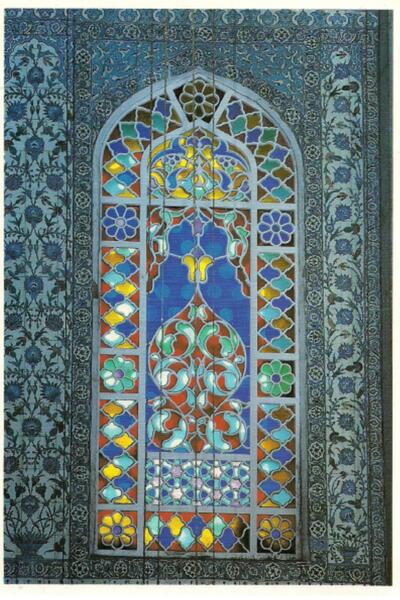 tariq-ensemble.jpg
tariq-ensemble.jpg
additional video footage of Todd Marcus ensembles
The Todd Marcus Jazz Orchestra
2013 at 14Karat Cabaret in Baltimore, MD
The Todd Marcus Quartet featuring clarinetist Don Byron
2013 at the MidAtlantic Jazz Festival in Rockville, MD
The Todd Marcus Quartet
2012 at Bohemian Caverns in Washington, DC
-
SummertimeIn addition to my work composing original music, I still love arranging jazz standards for my groups and this is a version of the jazz classic Summertime. The arrangement opens with a slow intro before going into a groove feel at 2:29 and features a rare use of a vocalist in my work. Filmed June 16, 2013 at the 14Karat Cabaret Club in Baltimore, MD The Todd Marcus Jazz Orchestra Todd Marcus (bass clarinet) Gary Thomas (tenor sax) Brent Birkhead (flute and alto sax) Russell Kirk (alto sax) Alex Norris (trumpet) Alan Ferber (trombone) Alex Brown (piano) Jeff Reed (bass) Eric Kennedy (drums) Irene Jalenti (vocals)
-
Todd Marcus Jazz Orchestra - PompeiiPerforming the Todd Marcus original composition Pompeii in 2009 at the Weinberg Center for the Arts in Frederick, MD. The performance features a gentle introduction before an uptempo theme and solos by Todd Marcus (bass clarinet) and Sean Jones (trumpet).
-
Todd Marcus Quartet - Blues for TahrirBlues for Tahrir is an example of one of my more recent fusions of jazz and Middle Eastern music as explained in the project description for my Todd Marcus Quartet. It uses a contemplative feel by the rhythm section and melodies by my clarinet that are composed of different Middle Eastern scales. This recording offers an alternate version of this composition to show how the piece can vary depending on which of my quartet musicians are on the performance. After solos the arrangement introduces a new Middle Eastern inspired melody which in a traditional Middle Eastern setting would be played in unison with other instruments or vocalists. In this setting though, I've assigned chords that fuse this Middle Eastern type theme with jazz harmonies without losing the essence of the Middle Eastern feel. Performed at Bohemian Caverns in December, 2012 in Washington, DC with: Todd Marcus (bass clarinet) George Colligan (piano) Warren Wolf (drums) Eric Wheeler (bass)
-
Blues for Tahrir - ReflectionsBlues for Tahrir is an example of one of my more recent fusions of jazz and Middle Eastern music as explained in the project description for my Todd Marcus Quartet. It uses a contemplative feel by the rhythm section and melodies by my clarinet that are composed of different Middle Eastern scales. The recording features clarinetist Don Byron, one of the pioneers of the clarinet in modern jazz. After solos by myself on bass clarinet and drummer Eric Kennedy, the arrangement introduces a new Middle Eastern inspired melody which in a traditional Middle Eastern setting would be played in unison with other instruments or vocalists. In this setting though, I've assigned chords that fuse this Middle Eastern type theme with jazz harmonies without losing the essence of the Middle Eastern feel. Performed at The MidAtlantic Jazz Festival, 2013 in Rockville, MD, DC with: Todd Marcus (bass clarinet) Don Byron (clarinet) Xavier Davis (piano) Eric Kennedy (drums) Eric Wheeler (bass)
-
Message to Prez / See the PositiveA rare filmed performance of my Todd Marcus Trio. Here the band is playing two compositions by jazz great Bennie Maupin, one of the few horn players to prominently use jazz in modern jazz. Performed at Crème Restaurant in Baltimore, MD on February 2012 with: Todd Marcus (bass clarinet) Joe Bussey (bass) Mike Kuhl (drums) Creme Restaurant Lounge, Baltimore, MD
-
SolsticeWhile much of my composing and arranging over recent years has used more complex harmonies and multiple themes, simpler pretty melodies remain a part of my work and this composition is an example of that. It is very much focused on a pure melody with a solo before introducing an interlude that leads to a second simple but powerful solo section featuring pianist George Colligan. Performed at Bohemian Caverns in December, 2012 in Washington, DC with: Todd Marcus (bass clarinet) George Colligan (piano) Warren Wolf (drums) Eric Wheeler (bass)
-
EpistrophyMy arrangement of the jazz standard Epistrophy by the great pianist Thelonius Monk that features my quartet plus Don Byron, one of the pioneers of the clarinet in modern jazz. Performed at The MidAtlantic Jazz Festival, 2013 in Rockville, MD, DC with: Todd Marcus (bass clarinet) Don Byron (clarinet) Xavier Davis (piano) Eric Kennedy (drums) Eric Wheeler (bass)
-
HerodAn early original composition of mine written in 1999 with a free-jazz introduction, early shades of Middle Eastern themes, and then an in-tempo movement starting at 3:15 that lead into solos. An early example of interest in writing compositions with multiple movements. Performed at Bohemian Caverns in December, 2012 in Washington, DC with: Todd Marcus (bass clarinet) George Colligan (piano) Warren Wolf (drums) Eric Wheeler (bass)
-
HeartlandsHeartlands is an original composition that incorporates Native America motifs and was inspired during a 2009 cross country trip as I passed through the desert of New Mexico. Filmed June 16, 2013 at the 14Karat Cabaret Club in Baltimore, MD The Todd Marcus Jazz Orchestra Todd Marcus (bass clarinet) Gary Thomas (tenor sax) Brent Birkhead (flute and alto sax) Russell Kirk (alto sax) Alex Norris (trumpet) Alan Ferber (trombone) Alex Brown (piano) Jeff Reed (bass) Eric Kennedy (drums)
-
Bye Bye BlackbirdMy arrangement of the popular jazz standard Bye Bye Blackbird including a solo intro by Marcus. Performed at Bohemian Caverns in December, 2012 in Washington, DC with: Todd Marcus (bass clarinet) George Colligan (piano) Warren Wolf (drums) Eric Wheeler (bass)











